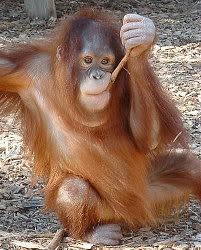Brenda Scott Royce, in the Huffington Post, writes,
" Apes in showbiz have a short shelf life.The primary purpose of the Center for Great Apes is to provide a permanent sanctuary in a safe and enriching environment for orangutans and chimpanzees in need of long-term life care … specifically those who have been used in entertainment, kept as pets by private owners, or served as research subjects.
The average performing chimp begins his career around age 2. By 7 or 8, when he's no longer the tractable trainee he once was, he's put out to pasture.
Owners tend to not want to keep apes that have outlived their earning potential, and since apes can live into their 50s, that means they'll require decades of care after their careers end. And that care is expensive -- roughly $10,000 a year for a single ape. And while typically everyone involved with a film -- from cast and crew to producers, studios, distributors, investors and exhibitors -- makes money, nothing is put aside for the animals' future. "
Currently, the Center houses forty-three apes, fourteen orangutans and twenty-nine chimpanzees, ranging in age from one to forty-six years. These great apes live in enriching environments and habitats, provided with proper nutrition and companionship and with their own species. They live in large 34-foot tall outdoor habitats with lots of climbing apparatus, swings, and enrichment toys. They sleep in attached heated nighthouses strong enough to withstand Florida hurricanes. The sanctuary is located in South Central Florida on 100 wooded acres surrounded by orange groves.
 Pebbles is one of the Center for Great Apes current residents. She arrived at the Center in December 2004 from a California trainer compound where she was worked as an infant in the entertainment business. She still had a few years of working ability ahead of her, but her owner decided to stop working great apes in shows and commercials.
Pebbles is one of the Center for Great Apes current residents. She arrived at the Center in December 2004 from a California trainer compound where she was worked as an infant in the entertainment business. She still had a few years of working ability ahead of her, but her owner decided to stop working great apes in shows and commercials.Pebbles loves to swing on vines in her enclosure, play in tubs of water, and wrestle with her orangutan roommates. One of her favorite enrichment activities is painting. Not only will she paint on paper or canvas given to her, Pebbles also enjoys covering herself with nontoxic paint!
via L.A. Unleashed
0 comments:
Post a Comment